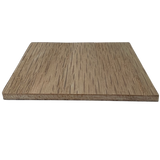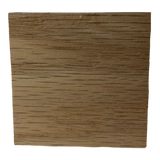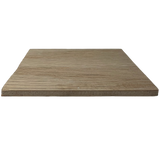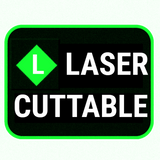Red Oak Veneer with MDF/Draftboard Core
Red Oak Veneer with MDF Core Plywood
Premium red oak veneer plywood with a smooth MDF core, perfect for laser cutting, CNC machining, furniture, and DIY craft projects – ideal for makers, designers, schools, and businesses!
Elevate your next project with our high-quality red oak veneer plywood, featuring a light reddish-brown A-grade face veneer and a stable Medium Density Fiberboard (MDF) core. The plain-sliced red oak veneer showcases a beautiful cathedral grain pattern, while the MDF core ensures uniform thickness and dimensional stability. The back (4-grade) side, typically oak, maple, or birch, may show minor imperfections like pin knots, open or filled knots, patches or veneer seams, making it ideal for hidden surfaces. This material combines the classic beauty of red oak with the precision of MDF, making it a top choice for professional and creative builds.
Available in 1/8" and 1/4" thicknesses and multiple stock sizes, including Glowforge-friendly 12" x 20". Order custom-cut panels online or contact support@makerstock.com. With $12 flat-rate shipping per 50lb box, it’s a cost-effective solution for all your crafting needs. Order now to create with style and precision!
Why Buy from MakerStock?
-
Premium Quality: A-grade red oak veneer with a smooth, light reddish-brown finish and a consistent MDF core (788 kg/m³ or 0.028 lb/in³) for clean laser cutting and engraving.
-
Large Stock Selection: Available in 1/8" (3mm) and 1/4" (6mm) thicknesses, with stock sizes from 8" x 12" to 24" x 48".
-
Custom Processing: Get the exact size you need without the hassle. Order cut-to-size panels online or email support@makerstock.com (typical 2-4 business day lead time).
-
Affordable and Fast Shipping: $12 flat-rate shipping per 50lb box across the continental US from our PA and UT warehouses.
-
Knowledgeable and Reliable Customer Support: Reach out via email (support@makerstock.com), phone, or LiveChat for material selection or project questions.
-
No Minimum Order Requirements: Whether you need one panel or a hundred, we cater to individuals, businesses, and schools.
Perfect For:
-
Laser Cutting & Engraving: Cuts cleanly with CO2 or diode lasers, leaving a dark, charred edge that can be left as-is or sanded for a clean finish. Create intricate signs, coasters, or jewelry.
-
CNC Milling & Machining: Fabricate furniture components, prototypes, or shop jigs with precision.
-
Furniture and Cabinetry: Build stunning tables, shelves, or cabinets with a high-end red oak finish.
-
Craft & School Projects: Ideal for STEM models, marquetry, inlays, or classroom art projects.
-
Decorative Applications: Design wall art, frames, or custom speaker enclosures leveraging MDF’s density for superior sound quality.
Project Inspiration:
-
Makers: Laser-cut red oak veneer keychains, engraved wall art, or CNC-milled furniture for a polished, professional look. Craft custom coasters with intricate engravings or build elegant jewelry boxes with a red oak finish.
-
Schools: Create educational kits like geometry puzzles, physics models, or topographic maps for interactive STEM learning. Laser-cut architectural models or historical replicas for classroom displays.
-
Businesses: Craft custom signage, product displays, or laser-engraved room dividers for enhanced aesthetics. Design branded desk organizers or premium packaging inserts for a luxurious customer experience.
-
Hobbyists: Design model train layouts, custom game boards, or marquetry inlays with the warm beauty of red oak. Build intricate scale models for wargaming terrain, laser-cut bookmarks with personalized engravings, or create decorative guitar picks for musicians.
-
Home Decor Enthusiasts: Laser-engrave custom wall panels with geometric patterns or family monograms. Craft unique picture frames, mirror borders, or layered 3D art pieces for a sophisticated home aesthetic.
-
Event Planners: Create elegant place cards, table numbers, or decorative centerpieces for weddings and events. Laser-cut red oak veneer ornaments for seasonal decor or personalized keepsakes.
Explore Related Products:
-
PSA Veneer Sheets: Add natural wood grain with our easy-to-use PSA veneer sheets in Red Oak, Cherry, Bamboo, or Walnut.
-
Melamine Faced MDF: Elevate projects with our two-sided Melamine with MDF Core for a ready-to-use, polished finish.
Specifications:
-
Material: Red oak veneer with Medium-Density Fiberboard (MDF) core, engineered from pre-consumer recycled wood fibers and low-emission resin.
-
Nominal Thickness Options:
-
1/8" / 3mm (0.093" - 0.133")
-
1/4" / 6mm (0.180" - 0.240")
-
-
Veneer Thickness: 0.010" – 0.020" (0.25mm – 0.50mm)
-
Density: 788 kg/m³ (0.028 lb/in³)
-
Finish: Smooth, sanded A-grade red oak veneer; 4-grade back (oak, maple, or birch); no protective masking.
-
Tolerances: Cut tolerance of ±0.188" for all panel dimensions (in inches).
-
Workability: Midweight, durable, paint- and stain-receptive. Easy to cut, drill, or glue. Finish with wipe-on polyurethane (e.g., Minwax) for best results.
-
Custom Sizes: Order via custom listings or email support@makerstock.com.
Pro Tip:
For optimal laser cutting, secure panels with a jig or tape to prevent movement. Sand lightly to remove charred edges if desired. Store sheets flat in a dry, temperature-controlled environment to maintain quality.
FAQs:
-
Is red oak veneer with MDF core good for laser cutting? Yes, it cuts cleanly with CO2 or diode lasers, producing crisp, browned edges for detailed designs.
-
Can I use this outdoors? This material is interior-grade and not moisture-resistant. For outdoor projects, consider marine-grade plywood.
-
Is it safe for school projects? Yes! Since Spring 2019, all MDF and plywood sold in the US comply with strict California and US EPA formaldehyde emission standards, ensuring very low formaldehyde levels. See EPA Formaldehyde Standards.
-
Can I paint or stain it? Absolutely. The smooth red oak veneer and MDF core are highly paint- and stain-receptive. Sand lightly and apply a primer for best results. Note that MDF absorbs stain heavily due to its density.
-
Can I use a diode laser? Yes, diode lasers can engrave and cut thin sheets (e.g., 1/8") with multiple passes. Check your laser’s manual for settings.
-
How does this differ from standard MDF? The red oak veneer adds a natural, high-grade wood finish, while the MDF core provides superior stability and smoothness compared to veneer core plywood. Standard MDF lacks the decorative veneer.

















